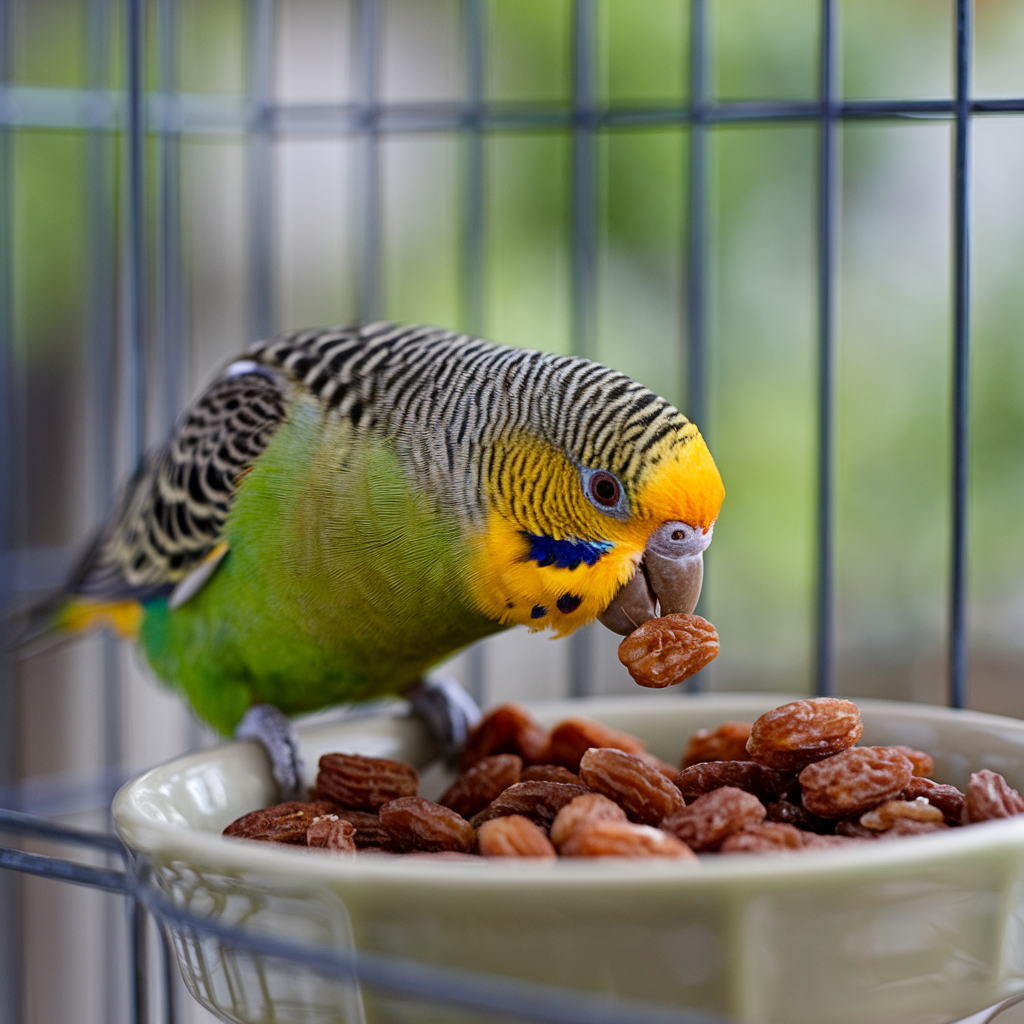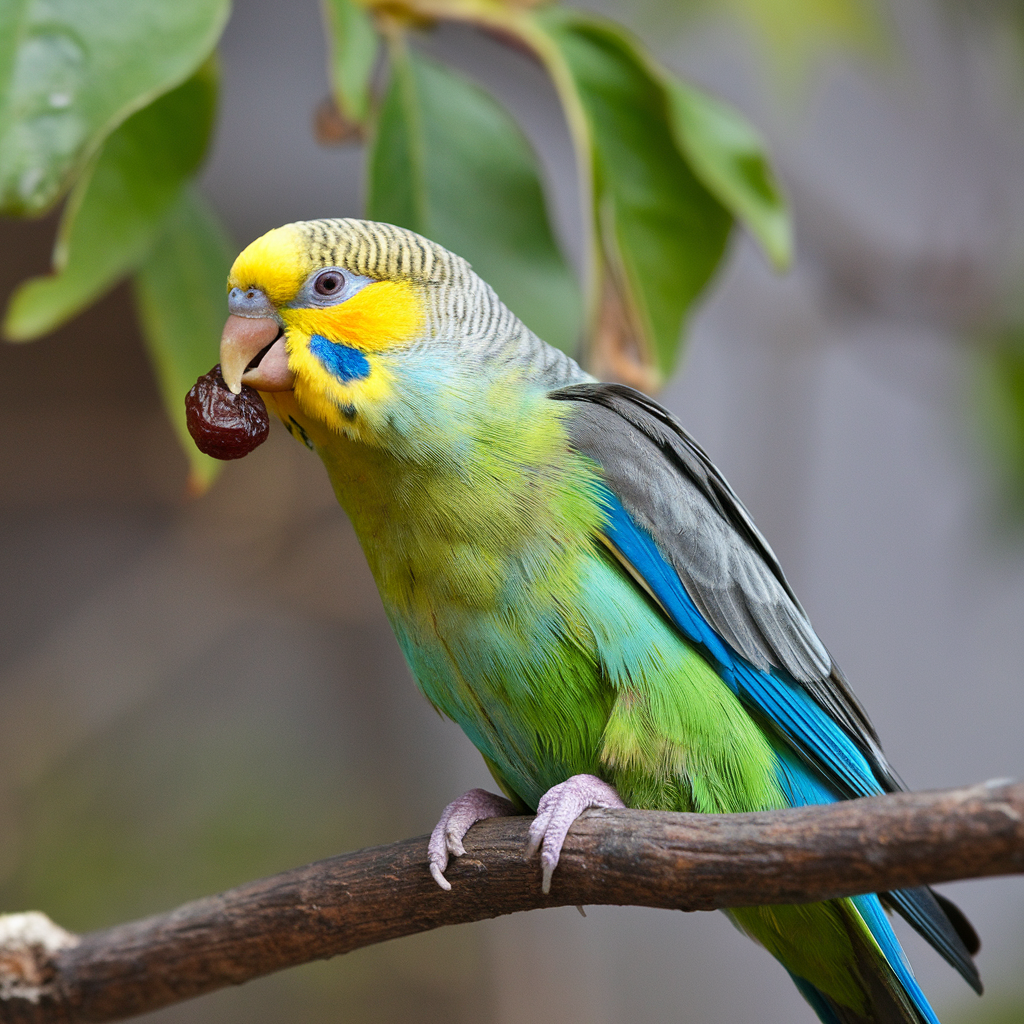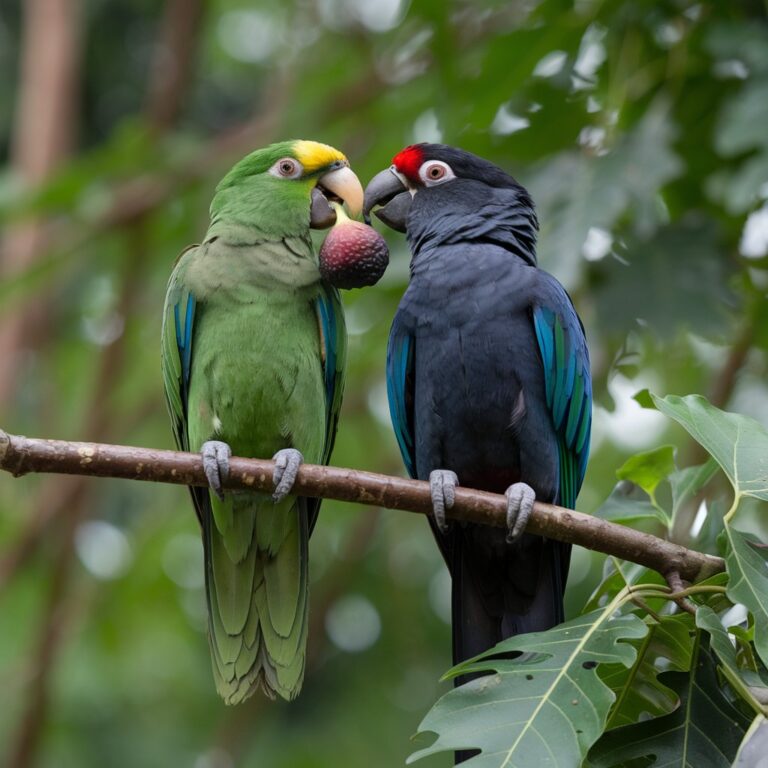Parakeets have specific dietary needs, and as a bird owner, you might wonder which treats are safe for your feathered friend. Raisins are often a topic of debate among bird enthusiasts. Yes, parakeets can eat raisins, but they should only be given as occasional treats in very small amounts due to their high sugar content.

I’ve found that while raisins aren’t toxic to parakeets like they can be to dogs and other pets, they should still be limited in a parakeet’s diet. Parakeets are mainly seed and grass eaters in the wild, so their digestive systems aren’t designed to process large amounts of sugary foods. Some bird experts even recommend avoiding raisins altogether and focusing on fresher fruit options that provide better nutrition with less sugar.
Key Takeaways
- Parakeets can eat raisins but only as rare treats in tiny amounts due to high sugar content.
- Fresh fruits and vegetables provide better nutritional value for parakeets than dried options like raisins.
- A balanced parakeet diet should primarily consist of high-quality seed mix, pellets, and fresh produce with minimal sugary treats.
Nutritional Value of Raisins for Parakeets

Raisins offer several nutritional benefits for parakeets when fed in moderation. These dried fruits contain natural sugars along with various micronutrients that can supplement a parakeet’s diet.
Vitamins and Minerals in Raisins
Raisins contain several vitamins that can benefit your parakeet’s health. They provide vitamin B complex, especially B6, which helps with nervous system function and metabolism. Raisins also contain small amounts of vitamin K, important for blood clotting and bone health.
The mineral content in raisins is quite impressive for such a small food. They contain iron and potassium, which support healthy blood cells and muscle function. Calcium is present in small amounts, contributing to bone health and egg production in female parakeets.
Raisins also contain trace minerals like copper and manganese. These help with enzyme functions and overall cellular health. However, I should note that the high sugar content means these nutritional benefits must be balanced against moderation in feeding.
Amino Acids and Antioxidants
Raisins aren’t particularly high in protein, but they do contain small amounts of amino acids that contribute to your parakeet’s overall nutrition. These building blocks of protein support feather development, muscle maintenance, and overall growth.
The most notable nutritional aspect of raisins is their antioxidant content. Raisins contain phenolic compounds and flavonoids that can help combat oxidative stress in your parakeet’s body. These compounds may support immune function and overall cellular health.
Raisins also contain natural fiber that aids digestion. This can be beneficial for parakeets, though too much may cause digestive upset. I recommend offering raisins sparingly to avoid potential fatty liver disease that can develop in birds from consuming too many sugary foods.
Safe Foods for Parakeets
Feeding your parakeet a variety of fresh foods alongside their seed mix provides essential nutrients for optimal health. A balanced diet includes specific fruits and vegetables that are both safe and nutritious.
Fruits Parakeets Can Enjoy
Parakeets can safely eat many fruits in moderation. Apples (seeds removed), berries, melons, and pears make excellent choices for your feathered friend. Small pieces of banana can be offered occasionally as they’re higher in sugar.
While grapes are safe for parakeets, they should be given sparingly. Raisins can be fed to parakeets in very small amounts as occasional treats only. They contain concentrated sugars that may contribute to health issues if overfed.
I recommend cutting all fruits into tiny pieces that match your bird’s beak size. This makes it easier for them to eat and reduces waste. Always wash fruits thoroughly to remove pesticides and chemicals.
Citrus fruits should be limited as they can cause digestive upset in some birds. Remove all seeds and pits as many contain harmful compounds.
Vegetables and Leafy Greens
Vegetables and leafy greens should form the foundation of your parakeet’s fresh food diet. Dark leafy greens like spinach, kale, and chard provide essential vitamins and minerals, though spinach should be limited due to oxalates.
Broccoli, carrots, and bell peppers are excellent veggie options rich in vitamins A and C. I find that my parakeets particularly enjoy small florets of broccoli and thinly sliced carrots.
Herbs like parsley and cilantro are not only safe but also add variety to your bird’s diet. Green beans and peas (fresh or thawed frozen) provide good plant protein sources.
Avoid feeding avocado, chocolate, and caffeine products as these are toxic to parakeets. Also, limit high-sodium foods and those with artificial additives.
For best results, I serve vegetables raw or lightly steamed without seasonings. Fresh is always best, but frozen vegetables (thawed) work well too.
Risks and Considerations for Feeding Raisins to Parakeets
Feeding raisins to parakeets requires careful attention to health risks and portion control. While these dried fruits can be offered, they come with important limitations that every parakeet owner should understand.
Potential Health Concerns
Raisins contain high concentrations of sugar that can cause serious health problems for parakeets. The most significant risk is fatty liver disease, which develops when parakeets consume too many sugar-packed foods. This condition can severely impact your bird’s quality of life and longevity.
Unlike other dried fruits, raisins are particularly concerning because of their fructose density. I’ve found that dried fruits in general should be limited, but raisins require special caution due to their concentrated sweetness.
When choosing dried fruits for your parakeet, I recommend looking for options with:
- No added sugar
- No artificial ingredients or preservatives
- Lower natural sugar content when possible
Dried apricots and cranberries might be better alternatives, but they still need to be offered sparingly as treats rather than daily foods.
Proper Serving Sizes
The correct portion size for raisins is extremely small for parakeets. I recommend offering only a tiny piece of raisin (about 1/4 of a regular raisin) no more than once a week as an occasional treat.
Fresh fruits generally provide better nutrition than dried varieties. If you’d like to offer grape flavor, a small piece of fresh grape is a safer option than raisins in most cases.
When introducing any dried fruit to your parakeet’s diet:
- Start with very small amounts
- Monitor your bird for any digestive issues
- Maintain it as an occasional treat only (less than 5% of total diet)
Remember that a parakeet’s primary diet should consist of high-quality seed mix, pellets, and fresh vegetables. I always ensure treats like raisins remain a tiny fraction of my bird’s overall food intake.
Creating a Balanced Diet for Parakeets
Parakeets need a varied diet to stay healthy. A proper mix of seeds, pellets, and fresh foods provides the nutrients these birds require for optimal health and longevity.
Seed and Pellet Mixes
Parakeets are primarily grainvores in the wild, eating seeds and grasses. A quality seed mix should form part of their diet, but not all of it. I recommend looking for mixes containing millet, sunflower seeds, and other smaller seeds.
Pellets should make up about 60-70% of a parakeet’s diet as they’re formulated with complete nutrition. These extruded foods contain vitamins and minerals that might be missing from seeds alone.
Many pet birds become picky eaters when offered only seeds. Seeds are high in fat but lack certain nutrients. Think of seeds like fast food for birds – tasty but not nutritionally complete.
Some pellets contain probiotics to support digestive health. I’ve found these particularly beneficial for maintaining a healthy gut in parakeets.
Supplementing with Fresh Foods
Fresh fruits and vegetables should make up about 20-30% of your parakeet’s diet. I recommend offering dark leafy greens, carrots, bell peppers, and apples regularly.
Regarding raisins, parakeets can eat them but only in moderation. They’re high in sugar, and too many can cause fatty liver disease in birds.
Other treats can include:
- Small pieces of corn
- Wheat berries
- Cooked beans (unsalted)
- Small amounts of nuts (unsalted almonds)
I avoid feeding peanuts as they can contain harmful fungi. When introducing new foods, I offer small amounts to see what my bird enjoys.
Fresh foods should be removed after a few hours to prevent spoilage. I make sure to wash all produce thoroughly to remove pesticides or chemicals before serving.
Frequently Asked Questions
Parakeet owners often have important questions about feeding raisins to their birds. These dried fruits require careful consideration regarding quantity, frequency, and potential health impacts.
What are the risks of feeding raisins to parakeets?
Raisins can pose health risks to parakeets when fed in excess. They contain high sugar concentrations which may lead to fatty liver disease in birds.
Sugar-packed foods like raisins can contribute to obesity in parakeets when overconsumed. This weight gain can lead to additional health complications over time.
Dried fruits are also more calorie-dense than fresh fruits, making it easier to accidentally overfeed your parakeet.
How often can parakeets safely consume raisins?
I recommend offering raisins as an occasional treat rather than a regular food item. Once or twice a week is sufficient frequency for most parakeets.
Always monitor your bird’s reaction when introducing raisins. Some parakeets may have individual sensitivities that aren’t common to the species.
Between raisin treats, focus on providing a balanced diet of quality seed mix, pellets, and fresh vegetables.
Are there any benefits to offering parakeets raisins as a treat?
Raisins can serve as an engaging treat that provides mental stimulation and variety in your parakeet’s diet. Birds often enjoy novel foods that break their routine.
They contain some natural vitamins and minerals, though in relatively small amounts compared to fresh fruits.
Raisins can also be useful as training rewards when teaching your parakeet new behaviors or tricks.
Is there a safe quantity of raisins that can be given to a parakeet?
A single small raisin or half of a larger raisin is an appropriate serving size for most parakeets. This limited portion helps prevent sugar overload.
I recommend chopping larger raisins into smaller pieces before offering them to your bird. This makes the treat last longer and reduces sugar consumption.
Always remove any uneaten raisins from the cage after feeding time to prevent spoilage.
Which fruits are considered healthy and safe for parakeet consumption?
Parakeets can safely eat grapes, which are the fresh version of raisins. Many find these juicier treats more hydrating and lower in concentrated sugars.
Apple (seeds removed), berries, melons, and small pieces of banana make excellent fruit options for parakeets. These provide various nutrients with less sugar concentration than dried fruits.
Citrus fruits should be offered sparingly due to their acidity, which may upset some birds’ digestive systems.
What should be considered when introducing human foods to a parakeet’s diet?
I always wash fruits thoroughly before feeding them to parakeets to remove pesticide residues. Organic options are preferable when available.
New foods should be introduced gradually while monitoring your bird’s reaction. Start with tiny amounts and observe for any digestive issues.
Remember that parakeets are primarily grainseekers in the wild, so human foods should complement rather than replace their core diet of quality seeds and pellets.

